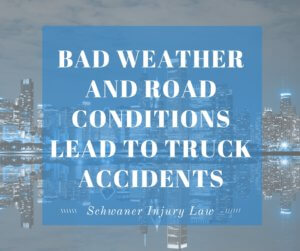Bad Weather and Road Conditions Cause Truck Accidents and Injury
Table of Contents
Winter weather can be a real hazard in Illinois, where snow, sleet, slush and ice can make roadways slick and treacherous for travel.

Winter conditions can be stressful for any driver, and staying in your own lane is tough enough without worrying whether other drivers can stay on the road without incident.
When sharing the road with a tractor-trailer, however, the stress levels increase considerably, especially given the size of the rig, which can crush a smaller vehicle if it should overturn or force a smaller car off the road by causing it to lose control when passing.
Why Are Semis More at Risk for Winter Accidents?
In winter, it isn’t a rarity to see a tractor-trailer jackknifed on the interstate, the contents of its trailer spilling out over the roadway. In November of 2017, a truck hit a median and crashed, spilling ethanol over the roads, which were closed until the spill could be cleaned up. Ice likely played a role in the incident. (Ref. 1)
Large, heavily-loaded semis can be especially at risk of accidents because their higher center of gravity makes them less stable than other vehicles, and more prone to both rollovers and jackknifing if they lose control on the road, which can be deadly not only for the big rig drivers, but also for anyone in the truck’s path.
What makes a semi more of a road hazard?
- It takes a tractor-trailer considerably more time to come to a stop than passenger vehicles, no matter the weather. On icy roads, it takes trucks even longer to come to a stop, and slick conditions such as black ice can cause a trailer to jackknife at any moment.
- Snowy conditions decrease visibility, which is a problem for truck drivers who are already saddled with blind spots that make it difficult to see the traffic surrounding him or her. When drivers can’t see well, it makes it easier to get into an accident.
- Windy conditions are not uncommon in Chicago and surrounding areas, given Chi-town’s nickname as The Windy City. When winds blow snow, visibility decreases, but it also makes it much harder for drivers to keep trucks on the road, because the higher center of gravity associated with the trailer makes trucks less stable, especially when it is carrying a full load of cargo. In 2012, 40 mph winds were blamed for two semi accidents that both overturned trailers and send the trucks’ drivers to local hospitals. (Ref. 2)
Drivers May Decide to Push Through a Storm and This Can lead to Accident and Serious Injury
Some drivers may be required by their companies to pull over when weather makes travel treacherous, but others may not have weather restrictions, so drivers may stay on the roads even when conditions make driving unsafe.
Tight deadlines and the time lost by traffic slowed by winter conditions will likely keep some drivers on the road despite dangers such as black ice, snow, sleet, hail or a wintry mix, all of which can make both visibility and vehicle control more difficult.
Like all of us behind the wheel, truck drivers, no matter how experienced they are, are likely more stressed in winter weather, under pressure to deliver cargo on time without causing an accident, which can lead to fatigue, delayed reactions and other road hazards.
Drivers in a hurry may engage in risky behavior including speeding, tailgating, failure to yield or improper lane changes, all of which can cause an accident.
For a driver of a car, SUV or pickup truck, winter driving is already stressful. Sharing the road with something as large and potentially deadly as a semi, which can lose control in an instant, can up the anxiety factor considerably.
So, what can we do to stay safe?
Preventing a Tractor-Trailer Accident Injury
While it is impossible not to share the road with semis, which transport goods from coast to coast year-round, there are ways to keep yourself safer during the winter months.
- Give trucks plenty of room. Because ice makes any roadway treacherous and a dusting of snow can make black ice impossible to avoid, avoid tailgating tractor-trailers or you may end up colliding with a driver that jackknifes in the road.
- Pass quickly but with care. When you pass a tractor-trailer, do it as quickly as safely possible to avoid getting sideswiped if a truck driver loses control of his rig.
- Make sure you’re visible to drivers. Keep your lights on, and be certain that drivers can see you if you’re traveling behind them by making sure you can see their side mirror. If you can’t see the driver, because of multiple blind spots, the driver cannot see you.
- Watch out for flying snow or ice. Truckers may not be diligent about clearing the snow and ice off their truck or trailer, leaving it for Mother Nature to handle. Imagine, however, if a large chunk of ice flew off the top of a trailer, striking your windshield. If a truck has ice accumulation, stay back or pass them to prevent a potential tragedy.
REFERENCES:

At the age of 31, David J. Schwaner became one of the youngest attorney’s in the history of Illinois to win a gross jury verdict of over 1 million dollars. Now, after working to recover millions of dollars on behalf of clients, David is a renowned personal injury attorney on a mission to fight back against the insurance companies and get you the financial compensation you deserve. Call 312-635-4000 to speak to David today.












